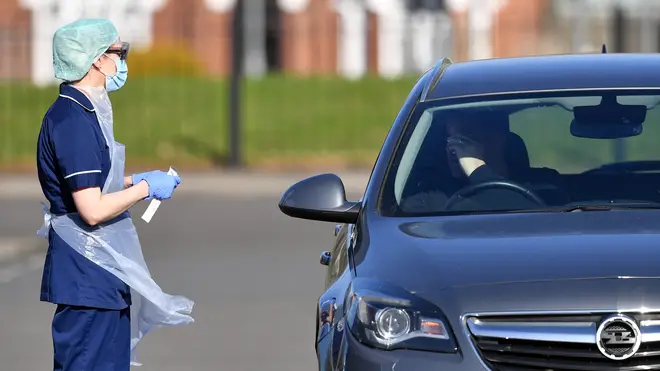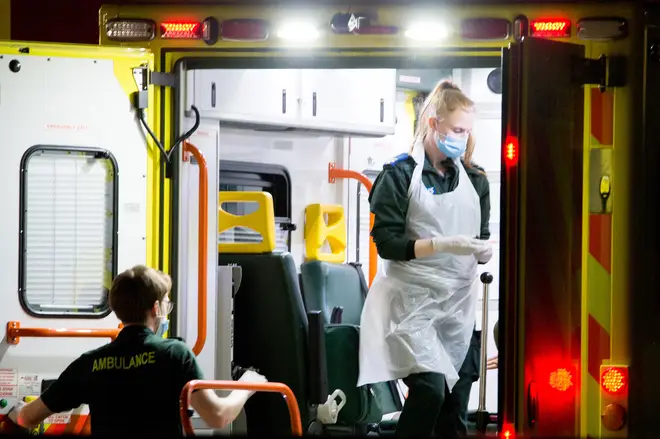
Clive Bull 1am - 4am
10 April 2020, 19:14

Health Secretary Matt Hancock has said that getting the necessary PPE equipment to all NHS staff will be a "Herculean effort".
Health and social care workers must treat protective equipment like the "precious resource that it is", the Health Secretary said as he set out the Government's plan to address shortages.
Matt Hancock said there is enough personal protective equipment (PPE) to go around if it is used in line with official guidance, and his goal is that "everyone" working in a critical role gets what they need.
FOLLOW OUR CORONAVIRUS LIVE BLOG
But he acknowledged distributing masks, gloves, aprons and hand sanitiser to frontline workers is requiring a "Herculean logistical effort".
Mr Hancock also cautioned against the use of protective gear outside of health and social care settings, saying hand washing, social distancing and staying at home are the best ways to keep safe.
"A front door is better than any face mask", he added.
Mr Hancock said: "There's enough PPE to go around, but only if it's used in line with our guidance.
"We need everyone to treat PPE like the precious resource that it is.
"That means only using it when there's a clinical need, and not using more than is needed."
Listen & subscribe: Global Player | Apple Podcasts | Google Podcasts | Spotify
But health bodies expressed scepticism, said protective gear should not be a "precious resource", and warned professionals would be angered by any suggestion that shortages are due to misuse.
The Health Secretary told the daily Downing Street press conference that more than 742 million pieces of PPE have been delivered so far during the outbreak.
This includes 161 million masks, 127 million aprons, one million gowns, and 345 million pairs of gloves, which have gone to hospitals, ambulance trusts, GPs, social care and pharmacies.
Some items can be used for a whole session and do not need to be changed each time they finish treating an individual patient, he added.
He said the UK pressures sit within a "huge international demand" for PPE and a "global squeeze" on supply.
The Government is publishing a PPE plan which has three strands, one of which is distribution.
Mr Hancock continued: "This is a Herculean logistical effort. We've brought together the NHS, private industry and the Army, in fact, the armed forces, to create a giant PPE distribution network on an unprecedented scale."
In order to ensure sufficient future supply, he is urging companies which can do so to "step up to the plate" and help with manufacturing.
It comes as the BMA medical union warned that PPE supplies in London and Yorkshire are at "dangerously low levels".
Dr Chaand Nagpaul, BMA council chair, said doctors are being forced into a corner and facing "heart-breaking decisions" over whether to carry on without proper protection.
He said: "This is an immensely difficult position to be in, but is ultimately down to the Government's chronic failure to supply us with the proper equipment."
Noting the Government's three-strand plan, he said: "PPE should not be a 'precious resource' and for NHS staff facing shortages of protection they need today, they don't want to hear of a plan, but that this vital equipment is made available to the frontline now."
Dr Layla McCay, director of the NHS Confederation, which represents organisations across the healthcare sector, said: "Our members have been telling us that, in particular, mental health teams and community staff such as pharmacists, family doctors and those in social care are not always receiving the equipment they need - we hope they will be reassured by this new plan.
"Ensuring personal protective equipment gets to the right places is key to any distribution plan's success and we are pleased this has been recognised although staff confidence will only increase when they see improvements on the front line.
"Staff in specialist and community health settings in particular will be working with often vulnerable individuals with risky behaviours, increasing their need for PPE."

Susan Masters, director of nursing at the Royal College of Nursing, said: "These figures on deliveries are only impressive when nursing staff stop contacting me to say what they need to use wasn't available.
"The calls are still coming through - people are petrified.
"They have seen colleagues die already.
"Things have improved in recent days and I credit the Government with that.
"But the safety of nurses and care staff must not be compromised.
"They are pretty clear about what they need to do to stay safe and they will be angered by any suggestion they cause shortages by misusing kit."
Rehana Azam, national officer of the GMB union, said: "Workers on the frontline will be sceptical about another delivery plan for protective equipment because the Prime Minister promised it by the 'end of the week'.
"That was three weeks ago.
"Many key workers have since lost their lives in the call of duty.
"Where is it?"